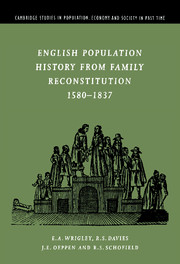9 - Conclusion
Published online by Cambridge University Press: 07 September 2010
Summary
Two long hot summers enclose the bulk of the work which resulted in the Population history of England and this volume. In 1976 work on the analysis of the aggregative data used in the Population history of England was in its very early stages. Primary collection of the raw material for the book was already complete, and, of the 530 aggregative tabulations which had been returned to the Cambridge Group by the volunteers who carried out the work, a total of 404 had been selected to form the empirical basis of the enterprise. In the summer of 1995 the last chapters of this present volume were being written under a brilliant sun and in unusual heat.
Between them the two volumes have substantially enhanced what is known about English population history. They have also altered its standing in two respects.
First, there is no other country for which detailed and internally consistent demographic information is available over such a long period. In the early decades of the twentieth century the longest coherent and accessible national data series was that for Sweden, due in large measure to the efforts of Sundbärg. The data were continuous from the middle of the eighteenth century. In Sweden there could be no doubt that the acceleration in population growth rates in the nineteenth century was due to falling mortality, with fertility for many decades remaining at the level of the late eighteenth century.
- Type
- Chapter
- Information
- English Population History from Family Reconstitution 1580–1837 , pp. 545 - 558Publisher: Cambridge University PressPrint publication year: 1997

